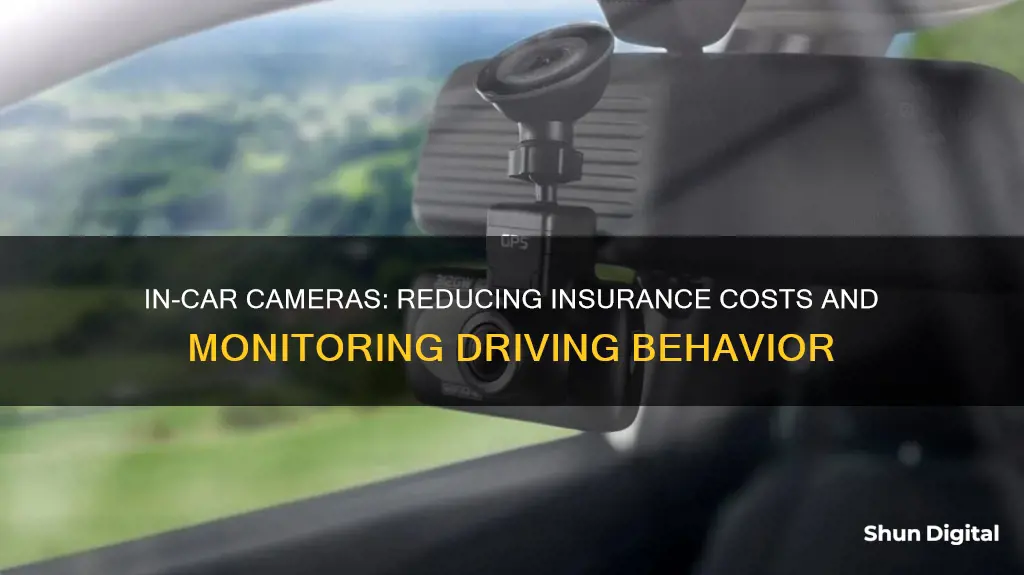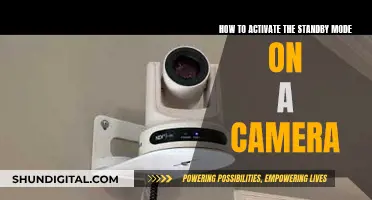
Dashcams, or dashboard cameras, are devices that record road activity and can be attached to the front or rear of a car, or both. While having a dashcam does not directly lower insurance rates, it can be beneficial in several ways. Dashcam footage can be used as evidence in insurance claims, helping to speed up the claims process and prove that an accident was not your fault. This can be particularly useful in cases of insurance fraud or staged accidents. Additionally, some insurance companies offer better deals to drivers with dashcams, as it makes them appear less risky. However, it's important to note that not all insurance companies offer dashcam discounts, and there may be strict rules about the type of footage they accept.
| Characteristics | Values |
|---|---|
| Impact on insurance rates | Having a camera in your car does not directly lower insurance rates. |
| Evidence for insurance claims | Cameras can provide video evidence to support insurance claims, which may help to resolve claims or accidents where fault is disputed. |
| Surveillance | Cameras can act as a form of surveillance to capture on-road footage. |
| Safety | Cameras encourage mindful driving and can help to identify unsafe driving practices. |
| Security | Cameras can act as a security measure to capture incidents of theft, vandalism, or damage to the vehicle. |
| Teen driver monitoring | Cameras can be used to monitor a teen's driving and help enforce safe driving practices. |
| Fraud prevention | Cameras can help prevent insurance fraud by providing a record of accidents or incidents. |
What You'll Learn

Dash cams can help prove your innocence in an accident
Dash cams are 'dashboard cameras' that are attached to the front interior of your car. They record what's happening on the road while you drive, and some also track GPS location. They can be useful when you need to prove an accident wasn't your fault. Dashcam footage could help speed up the claims process by providing direct evidence of what caused an accident, rather than relying on eyewitness accounts. This can be particularly useful in accidents where fault is disputed, such as when you are hit by a texting driver or given an unwarranted citation by law enforcement.
Dashcam footage can also help in cases of insurance fraud. For example, if someone tries to involve you in a staged accident for a fraudulent claims payout, having video evidence could help clear your name. In addition, dash cams can act as a security camera, providing footage of incidents that occur when your car is parked, such as theft, vandalism, or damage from falling objects.
It's important to note that not all insurance companies accept dashcam footage as evidence. Some companies only consider footage if the camera has been installed by a professional, and others may have specific suppliers they work with. Additionally, cheaper dash cams may produce grainy, low-quality footage that insurance companies are unlikely to accept. When purchasing a dashcam, it's important to consider features such as night vision and a wide-angle lens to ensure the footage is of good quality.
While having a dashcam may not directly lower your insurance rates, it can still positively impact your insurance experience by providing valuable evidence in the event of an accident or insurance fraud.
Fighting a Speeding Camera Ticket: Worth the Effort?
You may want to see also

Dash cams can help prevent insurance fraud
Dash cams are small cameras that can be mounted on the dashboard or windshield of a vehicle. They record everything that happens while driving, including accidents, near misses, and even thefts. This footage can be incredibly useful in the event of an accident, as it can help to provide evidence of what happened. This can be particularly useful if you are involved in a hit-and-run incident, as the footage can help to identify the culprit.
One of the biggest benefits of having a dash cam is its ability to help with insurance claims. When an accident occurs, it can often be difficult to prove who was at fault. Insurance companies will try to assign blame, which can result in higher premiums or even a denial of coverage. However, with a dash cam, you can provide clear evidence of the events leading up to and during the accident. This can help speed up the claims process and ensure you receive fair compensation.
Dash cams are particularly useful in preventing insurance fraud. Insurance fraud is a significant issue that costs the insurance industry billions of dollars annually. Dash cams can help deter and reduce the number of fraudulent claims filed. When there is clear video evidence of an incident, insurers can more accurately determine fault and avoid paying out on illegitimate claims. For example, dash cams can capture footage of staged accidents, which are a common type of insurance scam where fraudsters plan crashes that look real and then blame an innocent driver. With a dash cam, you have video proof that the accident was staged.
Additionally, dash cams can help to protect against exaggerated claims of injuries or damages. Fraudulent individuals may try to extract more money from insurance companies by exaggerating the extent of their injuries or the damage to their vehicle. Dash cams provide evidence that can support your case and prevent unwarranted payments due to false claims.
Overall, dash cams are a powerful tool in the fight against insurance fraud. By providing clear and objective evidence, they can help deter and prevent fraudulent claims, protect drivers from false accusations, and ensure a fair resolution for all parties involved.
Mastering Manual Focus Photography with the LG G5
You may want to see also

Dash cams can act as a security camera
Additionally, dash cams can capture unexpected incidents, such as being hit by a texting driver or receiving an unwarranted citation. The footage can then be used to reveal what truly transpired and protect the driver from false insurance claims. Some dash cams also offer advanced features such as AI surveillance, motion detection, and cloud video management, further enhancing their security capabilities.
While insurance companies may not offer direct discounts for dash cam usage, the presence of this technology can still provide significant benefits in terms of security and evidence collection, ultimately contributing to a faster and more accurate claims resolution process.
Overall, dash cams serve as a valuable tool for drivers, offering a sense of security and protection both while driving and when the vehicle is parked.
Activating Camera Mode in Kingdom Hearts 3 on Xbox
You may want to see also

Dash cams can monitor your teen's driving
Dash cams can be incredibly useful for monitoring your teens' driving. They can provide peace of mind for parents and help to keep young drivers safe on the roads. A dashcam can record the exterior and/or interior of a vehicle, capturing video footage of the road and the driver's behaviour. This can be invaluable if your teen is ever involved in an accident, providing evidence to support insurance claims and defend against any false accusations.
A forward-facing dashcam can show proof of fault in 90% of accidents, even if the impact itself is not captured on camera. For example, if your teen is rear-ended, a front-facing dashcam will show where your teen's vehicle was and why it stopped. If you want even more coverage, you can opt for a front and rear-facing dashcam system or a front and inside-facing system. This can be useful for monitoring your teen's driving habits and keeping tabs on where they are and have been.
The presence of a dashcam can also positively influence your teen's driving behaviour. Knowing that their actions are being recorded can deter teens from driving dangerously or recklessly. This can help to improve their driving skills and prevent accidents and tickets, keeping insurance rates low. Dashcams with real-time GPS tracking and live video streaming are particularly useful for monitoring your teen's driving behaviour and location.
Some dashcams, like the BlackVue DR750S-2CH-IR and the KENT CamEye CarCam 2, offer additional features such as remote live-viewing, speed alerts, emergency alarms, and two-way voice communication. These features can provide parents with even more data and control over their teen's driving experience.
San Diego's Camera Tickets: What You Need to Know
You may want to see also

Dash cams can be a distraction
Firstly, the placement of a dash cam can obstruct the driver's view. The camera's position on the dashboard or windshield may block a portion of the driver's field of vision, particularly if it is not properly installed or integrated with the vehicle's design. This obstruction can reduce the driver's ability to observe the road and their surroundings, potentially leading to hazardous situations.
Additionally, some dash cams have screens that display the footage being recorded. These screens can be distracting for drivers, especially if they are located directly in the driver's line of sight. The act of glancing at the screen, even briefly, takes the driver's eyes off the road, which can increase the risk of accidents. While some models offer a screensaver mode or allow the screen to be hidden or placed discreetly, not all dash cams have this feature.
The presence of a dash cam may also encourage some drivers to focus on capturing events rather than paying attention to the road. In the pursuit of recording sensational or unique footage, drivers might be incentivised to chase after events or re-position their vehicle to capture the best angle, compromising their attention and potentially increasing the likelihood of an accident.
Furthermore, the addition of a dash cam contributes to the overall complexity of a vehicle's dashboard and infotainment system. With multiple screens, controls, and interactive features vying for the driver's attention, the time spent looking at the road and other vehicles can be significantly reduced. This can be particularly challenging for new or inexperienced drivers who are still learning to manage their attention and adjust to the demands of operating a motor vehicle.
While dash cams offer benefits in terms of evidence gathering and promoting safer driving habits, it is important to acknowledge the potential for distraction. To mitigate these risks, drivers should ensure that their dash cam is properly installed and positioned to minimise obstruction. Additionally, utilising dash cam models with discreet screens or screensaver modes can help reduce visual distractions. Ultimately, it is the driver's responsibility to maintain focus and prioritise safe driving practices, even with the presence of a dash cam.
Where to Find Adobe Camera Raw
You may want to see also
Frequently asked questions
Having a camera, or dashcam, in your car won't typically lower insurance rates directly. However, it can help in other ways. For example, it can provide video evidence to support insurance claims and encourage mindful driving.
Dashcams can help resolve claims or accidents where fault is disputed by providing video evidence of what happened. This can expedite the claims process and prove that you're not at fault in a collision. Dashcams can also encourage mindful driving by reminding drivers to focus on the road.
While most insurance companies don't offer direct discounts for dashcams, some companies have started giving drivers with dashcams better deals and discounts. For example, Branch Insurance, an Ohio-based insurance startup, offers a dashcam discount. It's best to shop around and check with different insurance providers.







